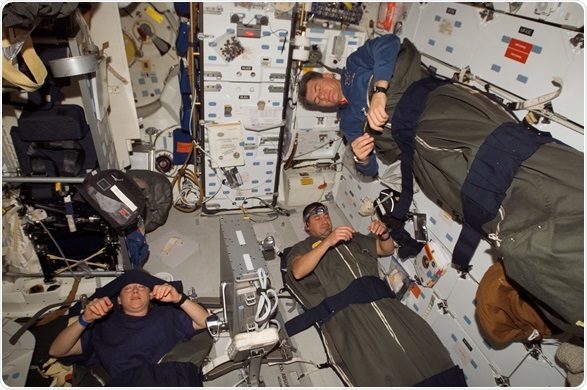The most comprehensive study of sleep patterns during spaceflight has just been published and confirms that astronauts suffer considerable sleep deficiency during both pre-mission training and spaceflight.
The study included objective (via an actigraph; a device worn on the wrist which records sleep and wake cycles) and subjective (via a daily diary recording alertness and sleep quality) assessments. A total of 85 astronauts (64 on 80 shuttle missions and 21 aboard the International Space Station [ISS]) participated in the study, and provided data for >4000 nights on Earth and >4200 nights in space.

Astronauts sleep in their sleeping bags, which are secured on the middeck of the Space Shuttle Discovery while docked with the International Space Station. Image Credit: NASA
During spaceflight each crew member has 8·5 hours of sleep scheduled per night. However, the study revealed that the average duration of sleep during spaceflight was just under 6 hours on shuttle missions and just over 6 hours on ISS missions. Sleep episodes lasting at least 7 hours were only achieved 12% of the time on shuttle missions and 24% of the time on ISS missions. The corresponding values after the mission (when most astronauts slept at home) were 42% and 50%, respectively.
The fact that the sun rises and sets every 90 minutes in space was thought to be the cause of sleep deprivation among astronauts, but sleep disturbances continue to occur despite the provision of quiet and dark ‘sleep stations’ on the ISS. Thus, it has been speculated that microgravity itself may affect sleep patterns. However, during training up to 3 months before the mission astronauts averaged <6·5 hours sleep per night, indicating that sleep deprivation is not restricted to spaceflight.
Dr Laura K Barger, the lead author, commented “It’s clear that more effective measures are needed to promote adequate sleep in crew members, both during training and spaceflight, as sleep deficiency has been associated with performance decrements in numerous laboratory and field-based studies.”
During the study, 75% of ISS crew members and 78% of shuttle-mission crew members reported taking sleeping medication, such as zolpidem and zaleplon, at some point during spaceflight. On the four shuttle missions where all crew members participated in the study, each member reported taking sleep-medications on the same night 6% of the time. Dr Barger highlighted “The ability for a crew member to optimally perform if awakened from sleep by an emergency alarm may be jeopardized by the use of sleep-promoting pharmaceuticals”.
Dr Mathias Basner from the University of Pennsylvania, USA remarked in a linked comment “Studies of the physiology of sleep stages and the intensity of sleep…in space are necessary to answer the important question of whether spaceflight reduces the need for sleep and therefore the ability to sleep, or whether it reduces the ability to sleep but not the need for sleep.”
Source:
Barger LK, et al. Prevalence of sleep deficiency and use of hypnotic drugs in astronauts before, during, and after spaceflight: an observational study. The Lancet Neurology, e-pub before print 8 August 2014. Available at http://www.thelancet.com/journals/laneur/article/PIIS1474-4422(14)70122-X/abstract